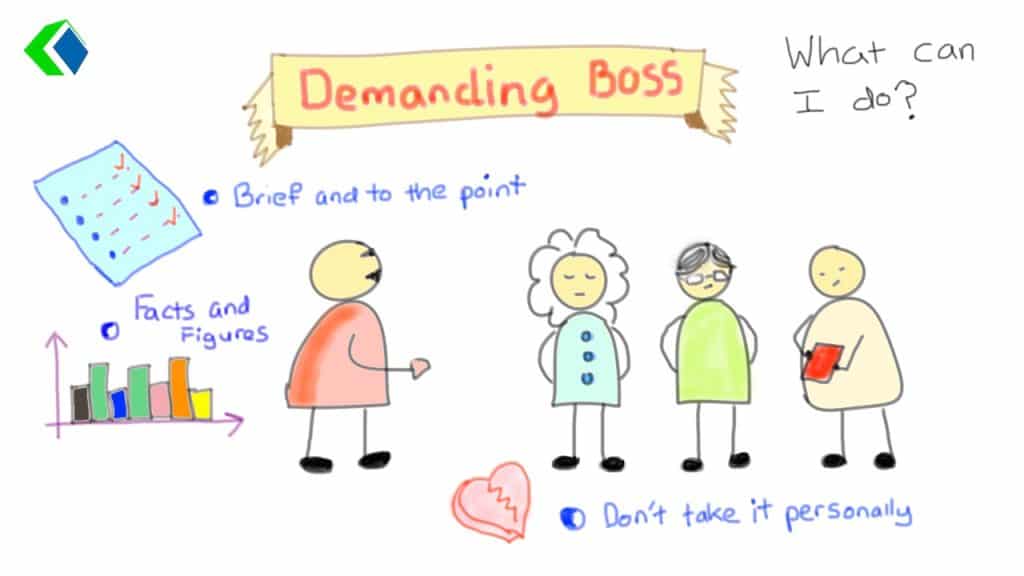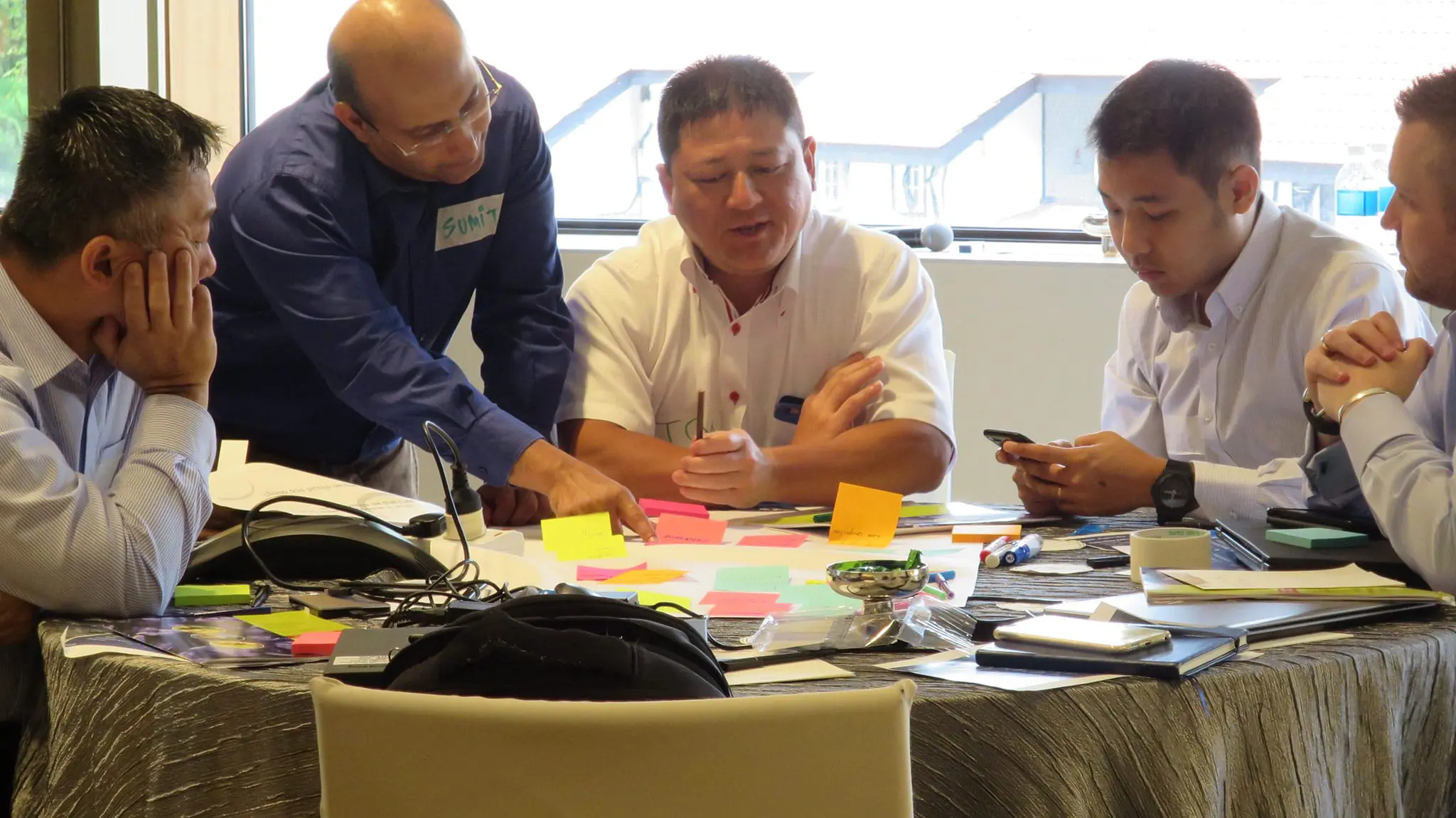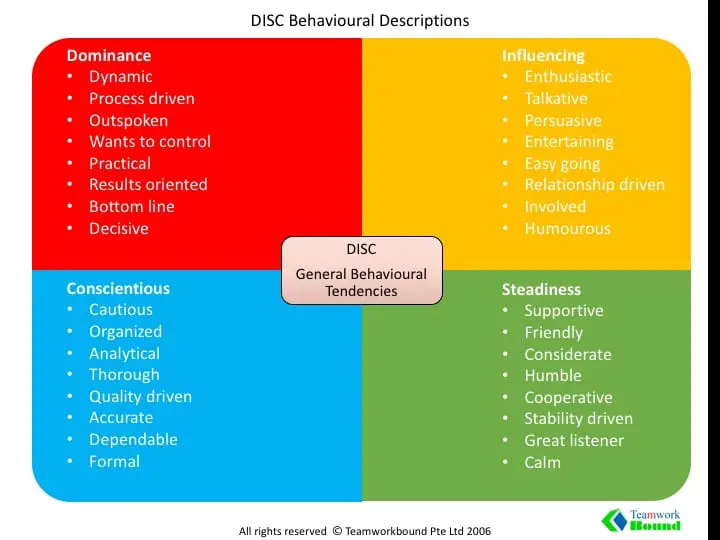Working with a demanding Boss
Embracing the intricacies of working with a demanding boss in DISC system emerges as a pivotal aspect for professionals striving for career advancement. In this captivating blog post, we embark on an exhilarating journey to unearth the profound significance of this dynamic relationship and its transformative potential for individual success.
Whether you’re a seasoned expert navigating the complexities of the DISC system or a novice eager to explore its depths, this article promises a treasure trove of invaluable insights and actionable strategies. Join us as we unravel the secrets to thriving under pressure and harnessing the formidable power of the DISC Personality Singapore to propel your career to unparalleled heights.
Prepare to be inspired as we delve into the art of navigating challenging dynamics with grace and finesse, equipping you with the tools and knowledge to excel in any professional setting. Let’s dive headfirst into this exhilarating exploration and unlock the keys to unlocking your full potential within the realm of DISC.
Overview of DISC and its relevance in understanding personality traits
Exploring personality traits is integral to understanding human psychology, with the DISC framework being a widely recognized tool for this purpose. In this concise blog post, we offer an overview of DISC and its relevance in dissecting personality traits. Whether you’re a psychology enthusiast or simply intrigued by human behavior, this article promises valuable insights into the realm of DISC and its role in deepening our understanding of ourselves and others. Let’s delve into this captivating journey and uncover how DISC illuminates the intricacies of personality.
II. Understanding the DISC Model
DISC model and its four personality types
Step into the captivating world of the DISC model and its four distinct personality types with our latest blog post. In this insightful article, we navigate the depths of this renowned model, uncovering its profound insights into human behavior and communication styles. Whether you’re an aspiring leader seeking to sharpen your skills or just fascinated by interpersonal dynamics, this comprehensive exploration of the DISC model promises to enrich your understanding. Join us as we embark on a journey to unravel the intricacies of personality types and unlock the secrets of effective interaction. Let’s embark on this thrilling odyssey into the realm of personalities!
–Significance of knowing your own DISC type and that of your boss
Knowing your own DISC type and that of your boss holds immense significance in the professional realm. Understanding these personality profiles enables you to adapt your communication style, anticipate their preferences, and build effective working relationships. By delving into the DISC model, you gain valuable insights that contribute to successful collaboration, increased productivity, and a harmonious work environment. Unlock the potential of DISC and revolutionize your approach to working with a demanding boss.
-Expanding on each personality type and their characteristics
Navigating the dynamic terrain of working with a demanding boss within the DISC framework requires a nuanced understanding of each personality type’s distinctive traits and expectations. The Dominant personality type, characterized by their decisive and assertive nature, sets high standards and anticipates swift outcomes. In contrast, the Influential personality type thrives on fostering connections and inspiring their team, prioritizing enthusiasm and collaboration. Meanwhile, the Steady personality type places emphasis on preserving harmony and stability, valuing loyalty and consistency within the team. Lastly, the Conscientious personality type brings meticulous attention to detail and a methodical approach, emphasizing precision and adherence to established procedures. By comprehending these diverse personality dynamics, professionals can adeptly navigate the demands of a challenging boss and foster productive collaborations within the workplace.- Explaining how each personality type may manifest in a demanding boss and their expectations

Working with a demanding Boss using DISC
Signs of a demanding BOSS in DISC (D style)
If you’re flourishing in an environment with a demanding boss, you likely recognize the signs that characterize such leaders. Here are some unmistakable traits of a demanding Leader, Manager, or Boss:
– Assertive, direct, and outspoken
– Formal in demeanor, prone to interrupting, and straightforward
– Exhibits impatience and a competitive spirit
– Driven by goals and performance metrics
– Solution-oriented, constantly seeking to resolve challenges
If you’ve identified with these traits, you’re likely experiencing or may anticipate challenges in the workplace. The key to thriving lies in effectively navigating this environment. Learn how to communicate with a demanding boss in our next article.

Challenges of Working with a Demanding Boss
– Identifying common challenges when dealing with a demanding boss
Dealing with a demanding boss can be a challenging experience that many individuals encounter in their professional lives. This report aims to identify and highlight some of the common challenges faced when dealing with a demanding boss. By understanding these challenges, individuals can develop effective strategies to navigate such situations and maintain a positive work environment.
High Expectations:
Demanding bosses often have high expectations for their employees, which can create pressure and stress. Employees may find it challenging to consistently meet these expectations, leading to feelings of inadequacy and increased workload.
Micromanagement:
One common challenge is dealing with a boss who micromanages their employees. This can result in a lack of autonomy and trust, as employees may feel constantly monitored and unable to make decisions independently.
Unrealistic Deadlines:
Demanding bosses may set unrealistic deadlines for projects or tasks, leading to increased stress and potential burnout. Employees may struggle to meet these deadlines while maintaining the quality of their work.
Lack of Communication:
Effective communication is crucial in any work environment. However, dealing with a demanding boss who fails to communicate clearly or consistently can create confusion and frustration among employees.
Emotional Volatility:
Some demanding bosses may exhibit emotional volatility, such as anger or mood swings, which can create a tense and uncomfortable work environment. Employees may find it challenging to navigate these emotional fluctuations and maintain their own emotional well-being.
Lack of Recognition:
Employees may face the challenge of working with a demanding boss who fails to recognize their efforts and achievements. This lack of recognition can demotivate employees and hinder their professional growth.
Work-Life Balance:
A demanding boss may expect employees to prioritize work over personal life, leading to an imbalance between work and personal commitments. This challenge can impact employee well-being and overall job satisfaction.
– How the boss’s DISC type can influence their behavior and expectations
The DISC model is a widely used behavioral assessment tool that categorizes individuals into four main personality types: Dominance (D), Influence (I), Steadiness (S), and Conscientiousness (C). This report aims to explore how a boss’s DISC type can influence their behavior and expectations in the workplace.
Dominance (D) Boss:
– Behavior: Assertive, direct, and results-oriented.
– Expectations: Focus on efficiency, productivity, and achieving goals. May prefer a fast-paced work environment and direct communication.
Influence (I) Boss:
– Behavior: Outgoing, sociable, and enthusiastic.
– Expectations: Emphasize teamwork, collaboration, and building relationships. May value creativity and innovation in problem-solving.
Steadiness (S) Boss:
– Behavior: Patient, reliable, and supportive.
– Expectations: Prioritize harmony, stability, and maintaining a positive work environment. May value loyalty and consistency in their team.
Conscientiousness (C) Boss:
– Behavior: Detail-oriented, analytical, and systematic.
– Expectations: Emphasize accuracy, quality, and adherence to procedures. May value thoroughness and precision in work.
Understanding the boss’s DISC type can provide valuable insights into their behavior and expectations. By recognizing their dominant traits, employees can adapt their communication and work style to better align with their boss’s preferences. This can lead to improved collaboration, productivity, and overall job satisfaction in the workplace.
– Impact on job satisfaction, stress levels, and overall performance
The boss’s DISC type significantly affects job satisfaction, stress levels, and team performance. Alignment boosts satisfaction; mismatch leads to stress. Harmonious alignment enhances collaboration and productivity. Understanding DISC types is key to fostering a positive workplace culture.
IV. Strategies for Effective Communication
Effective communication is pivotal for success in the workplace, especially when dealing with a demanding boss. Clear, concise communication fosters trust and prevents misunderstandings. Tailoring communication to the boss’s DISC type enhances rapport and understanding. Structured delivery of information and regular updates demonstrate accountability and transparency. Emotional intelligence and empathy facilitate navigating challenging situations with grace. By employing these strategies, employees can cultivate positive relationships and thrive in a demanding work environment.
V. Adapting to Different Working Styles
Understanding Individual Working Styles:
Recognizing the unique traits of each DISC type unveils valuable insights into individual working styles. Whether assertive Dominance or relationship-focused Influence, understanding these traits empowers employees to adapt their approaches effectively.
Aligning with Your Demanding Boss:
Observing and mirroring the preferences of a demanding boss is key to fostering effective communication and rapport. By aligning with their communication style and decision-making approach, employees can establish mutual understanding and enhance collaboration.
Fostering Collaboration:
Seeking common ground and collaborating with a demanding boss cultivates a productive work environment. Identifying shared goals and interests paves the way for stronger working relationships and increased synergy in achieving objectives.
Leveraging Strengths:
Recognizing the strengths of both oneself and the demanding boss is paramount for success. Leveraging individual DISC type strengths and appreciating those of the boss enhances mutual respect and collaboration, ultimately driving performance and productivity.
Incorporating strategies to recognize and adapt to individual working styles based on DISC types is essential for fostering effective collaboration and productivity in the workplace. By aligning with the preferences of a demanding boss, fostering collaboration, and leveraging strengths, employees can cultivate harmonious working relationships and drive success.
VI. Managing Expectations and Setting Boundaries
Understanding the Boss’s Expectations:
Efficiently managing expectations begins with a clear understanding of the boss’s priorities and objectives. Engage in open communication to clarify expectations and ensure alignment with organizational goals.
Communicating Limitations and Workload Management:
Transparently communicate your limitations and capacity to effectively manage workload. Establish boundaries by articulating realistic timelines and deliverables, ensuring commitments are manageable and achievable.
Negotiating Realistic Deadlines:
Navigate expectations by negotiating realistic deadlines based on workload and capacity. Prioritize tasks in alignment with organizational objectives, advocating for reasonable timelines that support quality work and prevent burnout.
Balancing Work-Life Boundaries:
Maintain a healthy work-life balance by setting boundaries and communicating personal needs effectively. Advocate for time off and establish boundaries around after-hours communication to preserve personal well-being and prevent burnout.
Providing Guidance on Time Management:
Offer guidance on effective time management and prioritization to optimize productivity. Collaborate with the boss to establish clear priorities and develop strategies for managing competing demands efficiently.
Incorporating these strategies fosters a collaborative and supportive work environment, where expectations are managed effectively, and boundaries are respected, ultimately enhancing productivity and well-being.
VII. Building a Strong Working Relationship
Trust and Rapport:
Forge trust and rapport with a demanding boss through open communication and reliability.
Leveraging DISC Strengths:
Utilize your DISC type strengths to complement the boss’s style, enhancing collaboration.
Respectful Professionalism:
Maintain professionalism and respect in interactions, fostering a positive work environment.
Conflict Resolution:
Address conflicts with empathy and effective communication, focusing on constructive solutions.
VIII. Dealing with Conflict and Handling Difficult Situation
Strategies for Diplomatic Conflict Resolution:
Employ tact and diplomacy when handling conflicts with a demanding boss. Approach discussions with a focus on understanding perspectives and finding mutually beneficial solutions.
Managing Disagreements and Providing Feedback:
Utilize techniques such as active listening and constructive feedback to manage disagreements effectively. Offer solutions-oriented feedback while maintaining professionalism and respect.
Knowing When to Escalate Issues:
Recognize the importance of knowing when to escalate issues and seek support from HR or higher management. Assess the severity of the situation and escalate accordingly, ensuring timely resolution and preservation of professional relationships.
IX. Self-Care and Managing Stress
Recognizing and Managing Stress:
Acknowledge and address stress resulting from working with a demanding boss. Practice self-awareness and employ stress-management techniques such as deep breathing, mindfulness, and time management to alleviate stressors.
Implementing Self-Care Practices:
Prioritize self-care to maintain a healthy work-life balance. Incorporate activities such as exercise, hobbies, and relaxation techniques into your routine to recharge and rejuvenate.
Seeking Support from Colleagues and Mentors:
Reach out to colleagues and mentors for support and guidance when facing stress and challenges. Share experiences and seek advice to gain perspective and develop coping strategies.
Professional Counseling:
Consider seeking professional counseling or therapy if stress becomes overwhelming or impacts your well-being. A qualified counselor can provide strategies for managing stress and offer support in navigating difficult situations effectively.
X. Professional Development and Growth
Working with a demanding boss within the framework of DISC can serve as a catalyst for professional development and growth. By navigating the complexities of different DISC types, employees gain valuable insights into communication styles, decision-making processes, and leadership approaches. Leveraging this experience fosters the enhancement of crucial skills such as adaptability, resilience, and conflict resolution. Employees learn to tailor their communication and work approaches to align with the preferences of their boss, honing their ability to navigate diverse personalities effectively. Furthermore, confronting challenges in this dynamic environment encourages continuous learning and personal growth, as individuals strive to improve their performance and expand their capabilities. Embracing the opportunity to work with a demanding boss in DISC not only strengthens professional skills but also cultivates a mindset of continuous improvement and advancement.
How to work with a demanding boss
When collaborating with a demanding boss, exude confidence and assertiveness in expressing your viewpoints. Embrace differing perspectives by understanding their viewpoint before asserting your own. Maintain a focus on factual discussions, avoiding unnecessary small talk to streamline communication. Deliver concise messages with precision and clarity, ensuring maximum impact. Prior to meetings, adequately prepare yourself to adapt to your boss’s style, allowing for seamless interactions. Anticipate potential issues and proactively devise solutions, presenting them with a balanced analysis of their pros and cons. While your boss may exhibit traits like loudness and directness, maintain composure and refrain from mirroring such behaviors. Remember, feedback should be viewed objectively, devoid of personal implications, fostering professional growth and resilience.

DISC behavioural descriptions
Having worked with D bosses before, my advice to you is as follows. If you can work with D bosses, there will be plenty of opportunities for you to learn from the toughest task master out there. If you can win the confidence of your demanding boss, high chance you will go a long way in your career. Keep going and don’t throw in the towel. Do get in touch with us.
Effectively collaborating with a demanding boss within the DISC framework is pivotal for professional success. Recognizing and accommodating various personality types fosters productive working relationships and enhances communication. By understanding the nuances of DISC profiles, individuals can tailor their approaches to align with their boss’s preferences, leading to improved collaboration and efficiency. Furthermore, embracing this opportunity encourages continuous learning and personal development. Adapting to different personality types cultivates adaptability and resilience, essential qualities for navigating the complexities of the workplace. Therefore, working effectively with a demanding boss in DISC not only strengthens professional skills but also fosters a culture of growth and advancement.
About the Author: Ebnu Etheris Ma.IDT, B.Hrd
Related Posts
- Categories: DISC profiling tool, People analytics
We worked with the management team comprising of Heads of departments, Vice Principals and the school Principal for Horizon Primary school, using DISC personality profiling systems.
- Categories: DISC profiling tool, People analytics
In today's competitive business landscape, effective team collaboration and talent retention are crucial for organizational success. One powerful tool that can facilitate both of these objectives is the use of DISC model. Find out how you use this tool to maximise engagement and team performance at work.
Top 10 activities
This blog will showcase top 10 experiential activities that we have conducted in our training programs. Included are models associated with experiential learning, team dynamics, understanding personality and leadership. We will showcase crisp summary of good books we have read on this blog as well.
Ebnu Etheris
MA.IDT and B. Ed & Trn
Founder Teamworkbound
Magazine Feature

Personal Excellence Magazine (Aug 2014 issue) based in Canada featured our article.

Human Resources Magazine (July 2012 issue), featured Teamwork Bound views on what it takes to engage senior managers.
Our Evaluations
Blog articles
Get started with Teamwork Bound
Want to learn what Teamwork Bound can do for you? See for yourself with a free trial, tests and short in house speaking engagements. We will assure you that our program evaluations meet 85% percentile score, failing which we will not charge for our training sessions.
